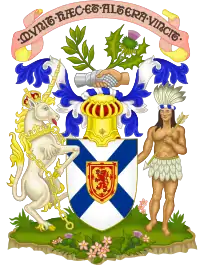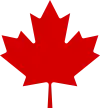Nova Scotia Liberal Party
The Nova Scotia Liberal Party is a centrist provincial political party in Nova Scotia, Canada and the provincial section of the Liberal Party of Canada. The party currently forms government in Nova Scotia, under the leadership of Premier Stephen McNeil. It has held power in the province since the 2013 election, and the current government led by Stephen McNeil was the first in Nova Scotia to win 2 consecutive majorities since the government of John Buchanan,[1] after the victory in the 2017 Nova Scotia election.
Nova Scotia Liberal Party | |
|---|---|
| Active provincial party | |
 | |
| Leader | Iain Rankin |
| President | Joseph Khoury |
| Secretary | Janet Becigneul |
| Founded | 1883 |
| Headquarters | 5151 George Street Suite 1400 Halifax, Nova Scotia B3J 2T3 |
| Ideology | Liberalism |
| Political position | Centre |
| National affiliation | Liberal Party of Canada |
| Colours | Red |
| Seats in House of Assembly | 26 / 51 |
| Website | |
| Official website | |
| Wikinews has related news: |
Origins
The party is descended from the pre-Confederation Reformers in Nova Scotia who coalesced around Joseph Howe demanding the institution of responsible government. The Liberals (Reformers) formed several governments in the colony between 1848 and 1867.
The party split during the debate on Confederation, with Howe and most other Liberals forming an Anti-Confederation Party, while supporters of confederation joined Tory Charles Tupper's Confederation Party. Howe, himself, initially opposed Confederation, but accepted it as a reality after initial attempts to scuttle it failed.
In 1868, Howe joined the pro-Confederation forces, serving for a time in the federal Cabinet of Sir John A. Macdonald.
The Anti-Confederation Party took most of Nova Scotia's seats in the House of Commons of Canada in 1867, as well as forming the government of the new province under William Annand. The new, post-1867 Liberal Party was organised by Annand and his anti-Confederate forces, while the Conservative Party was organised by Tupper and supporters of Sir John A. Macdonald's coalition in the province.
Prior to 1956, the Nova Scotia Liberal Party had ruled the province for 76 of its 89 years, most of that time with fewer than 5 opposition members. It had also ruled prior to confederation, and was responsible for bringing the first responsible government to North America. From 1882 to 1925, the Liberals held power for an unbroken 43 years, the second longest serving political dynasty in Canadian history, behind the Alberta PCs.[2]
The party in recent years
From 1956 the Tories gained significant ground with Robert Stanfield's reformation of the "Progressive Conservatives", and have successfully challenged the Liberals for control of the government. The Liberals faltered in the province at the beginning of the 21st century, and for a time were the third-largest party in the House of Assembly, behind the Tories and the Nova Scotia New Democratic Party. After the Nova Scotia Liberal Party's dismal performance in the 2006 election (and failing to win his own seat), leader Francis MacKenzie announced his resignation.[3] He was succeeded by Stephen McNeil. In the 2009 election, the Liberals moved out of third-party status and formed the official opposition once again. In the 2013 election, the Liberals won a majority government, their first since the 1993 election under John Savage, and took office for the first time in 14 years.[4] Under McNeil, a self-described fiscal conservative, the party pushed for balanced provincial budgets and took a firm stance against public sector unions.[5]
The Nova Scotia Liberals are the provincial section of the federal Liberal Party of Canada. The two parties have a shared membership, and Liberal Members of Parliament often become Liberal Members of the Legislative Assembly, and vice versa. Gerald Regan, for instance, became leader of the provincial party after serving as a Liberal MP. He joined the federal Liberal government after serving as premier of Nova Scotia. Angus L. Macdonald, the province's most storied Liberal premier, split his term into two by spending five years as a federal Liberal cabinet minister in the wartime government of William Lyon Mackenzie King.
On August 6, 2020, Stephen McNeil announced he will step down as party leader and that he will continue to act as premier and as the party's leader until the a replacement is found.[6]
Current elected members
| Name | Riding | Year elected |
|---|---|---|
| Iain Rankin | Timberlea-Prospect | 2013 |
| Patricia Arab | Fairview-Clayton Park | 2013 |
| Karen Casey | Colchester North | 2006 |
| Zach Churchill | Yarmouth | 2010 |
| Keith Colwell | Preston | 2003 |
| Randy Delorey | Antigonish | 2013 |
| Lena Diab | Halifax Armdale | 2013 |
| Rafah DiCostanzo | Clayton Park West | 2017 |
| Mark Furey | Lunenburg West | 2013 |
| Leo Glavine | Kings West | 2003 |
| Lloyd Hines | Guysborough–Eastern Shore–Tracadie | 2013 |
| Bill Horne | Waverley-Fall River-Beaver Bank | 2013 |
| Tony Ince | Cole Harbour-Portland Valley | 2013 |
| Keith Irving | Kings South | 2013 |
| Ben Jessome | Hammonds Plains-Lucasville | 2013 |
| Labi Kousoulis | Halifax Citadel-Sable Island | 2013 |
| Suzanne Lohnes-Croft | Lunenburg | 2013 |
| Stephen McNeil | Annapolis | 2003 |
| Geoff MacLellan | Glace Bay | 2010 |
| Brendan Maguire | Halifax Atlantic | 2013 |
| Margaret Miller | Hants East | 2013 |
| Derek Mombourquette | Sydney-Whitney Pier | 2015 |
| Kevin Murphy | Eastern Shore | 2013 |
| Chuck Porter | Hants West | 2006 |
| Kelly Regan | Bedford | 2009 |
| Gordon Wilson | Clare-Digby | 2013 |
Party leaders
- James B. Uniacke (1840–1854)
- William Young (1854–1860)
- Joseph Howe (1860–1864)
- Adams G. Archibald (1864–1867)
- William Annand (1867–1875)
- Philip Carteret Hill (1875–1878)
- William F. McCurdy (1878–1882) (house leader)
- William Thomas Pipes (1882–1884)
- William Stevens Fielding (1884–1896)
- George Henry Murray (1896–1923)
- Ernest Howard Armstrong (1923–1925)
- William Chisholm (1925–1930)
- Angus L. Macdonald (1930–1940)
- A.S. MacMillan (1940–1945)
- Angus L. Macdonald (1945–1954)
- Harold Connolly (1954) (interim)
- Henry Hicks (1954–1961)
- Earl W. Urquhart (1961–1965) (house leader 1961–1962)
- Gerald Regan (1965–1980)
- Benoit Comeau (1980) (interim)
- Sandy Cameron (1980–1985)
- Vince MacLean (1985)
- Bill Gillis (1985–1986) (interim)
- Vince MacLean (1986–1992)
- John Savage (1992–1997)
- Russell MacLellan (1997–2000)
- Wayne Gaudet (2000–2002) (interim)
- Danny Graham (2002–2004)
- Wayne Gaudet (2004) (interim)
- Francis MacKenzie (2004–2006)
- Michel Samson (2006–2007) (interim)
- Stephen McNeil (2007–2021)
- Iain Rankin (2021-Present)[7]
Election results
| Election | Leader | Votes | % | Seats | +/– | Position | Government |
|---|---|---|---|---|---|---|---|
| 1867 | William Annand | 58.6 | 36 / 38 |
Majority | |||
| 1871 | 52.2 | 24 / 38 |
Majority | ||||
| 1874 | Philip Carteret Hill | 55.0 | 22 / 38 |
Majority | |||
| 1878 | 45.1 | 6 / 38 |
Opposition | ||||
| 1882 | None | 51.8 | 24 / 38 |
Majority | |||
| 1886 | William Stevens Fielding | 54.7 | 28 / 38 |
Majority | |||
| 1890 | 52.2 | 29 / 38 |
Majority | ||||
| 1894 | 51.9 | 25 / 38 |
Majority | ||||
| 1897 | George Henry Murray | 55.0 | 34 / 38 |
Majority | |||
| 1901 | 56.7 | 36 / 38 |
Majority | ||||
| 1906 | 53.2 | 32 / 38 |
Majority | ||||
| 1911 | 51.1 | 26 / 38 |
Majority | ||||
| 1916 | 50.4 | 31 / 43 |
Majority | ||||
| 1920 | 44.4 | 29 / 43 |
Majority | ||||
| 1925 | Ernest Howard Armstrong | 36.3 | 3 / 43 |
Opposition | |||
| 1928 | William Chisholm | 47.2 | 18 / 43 |
Opposition | |||
| 1933 | Angus Lewis Macdonald | 52.6 | 22 / 30 |
Majority | |||
| 1937 | 51.0 | 25 / 30 |
Majority | ||||
| 1941 | Alexander Stirling MacMillan | 52.6 | 22 / 30 |
Majority | |||
| 1945 | Angus Lewis Macdonald | 52.7 | 28 / 30 |
Majority | |||
| 1949 | 51.0 | 27 / 37 |
Majority | ||||
| 1953 | 49.0 | 22 / 37 |
Majority | ||||
| 1956 | Henry Hicks | 48.2 | 18 / 43 |
Opposition | |||
| 1960 | 42.6 | 15 / 43 |
Opposition | ||||
| 1963 | Earl Wallace Urquhart | 39.7 | 4 / 43 |
Opposition | |||
| 1967 | Gerald Regan | 41.8 | 6 / 46 |
Opposition | |||
| 1970 | 46.1 | 23 / 46 |
Minority | ||||
| 1974 | 47.9 | 31 / 46 |
Majority | ||||
| 1978 | 39.4 | 17 / 52 |
Opposition | ||||
| 1981 | Sandy Cameron | 33.2 | 13 / 52 |
Opposition | |||
| 1984 | 129,310 | 31.3 | 6 / 52 |
Opposition | |||
| 1988 | Vince MacLean | 186,007 | 39.6 | 21 / 52 |
Opposition | ||
| 1993 | John Savage | 243,298 | 49.7 | 40 / 52 |
Majority | ||
| 1998 | Russell MacLellan | 158,620 | 35.3 | 19 / 52 |
Minority | ||
| 1999 | 128,795 | 29.8 | 11 / 52 |
Opposition | |||
| 2003 | Danny Graham | 128,417 | 31.5 | 12 / 52 |
Opposition | ||
| 2006 | Francis MacKenzie | 94,872 | 23.4 | 9 / 52 |
Opposition | ||
| 2009 | Stephen McNeil | 112,160 | 27.2 | 11 / 52 |
Opposition | ||
| 2013 | 190,112 | 45.7 | 33 / 51 |
Majority | |||
| 2017 | 157,541 | 39.5 | 27 / 51 |
Majority |
See also
| Wikimedia Commons has media related to Liberal Party of Nova Scotia. |
References
- "Nova Scotians elect Stephen McNeil's Liberals to second straight majority government". Global News. Retrieved 2017-12-03.
- "Alberta keeps Tories". The Chronicle Herald. April 24, 2012. Retrieved 2012-05-12.
- "MacKenzie steps down as Liberal leader". CBC News. June 20, 2006. Retrieved 2013-10-09.
- "Stephen McNeil leads Liberals to majority in Nova Scotia". CBC News. October 8, 2013. Retrieved 2013-10-09.
- "Liberal Premier Stephen McNeil: Nova Scotia's soft-spoken fiscal hawk". The Chronicle Herald. The Canadian Press. Archived from the original on December 4, 2017.
- Grant, Taryn. "Nova Scotia Premier Stephen McNeil to step down after 17 years in politics". CBC News. Retrieved 20 August 2020.
- Rankin, Iain (2021-02-06). "Premier-designate Iain Rankin delivers his first speech as Leader of the Nova Scotia Liberal Party". Twitter.

